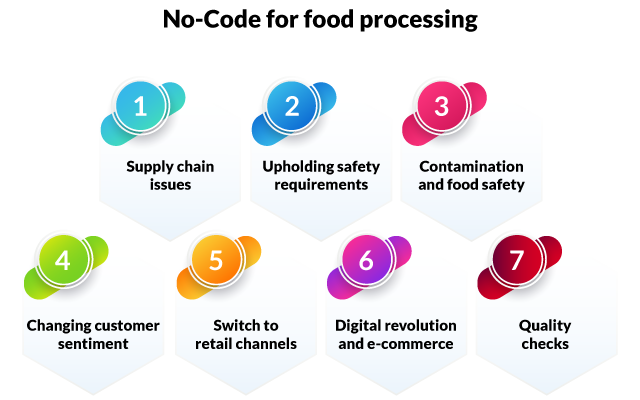
The food processing industry has been growing steadily and it shows no signs of stopping. However, with the pandemic disrupting the workflows and value chains, it became apparent that the main players in the food processing industry would have to adapt and evolve to fulfill the new customer needs. This prompted the introduction of automation and e-commerce at a rate that hadn’t been seen before as well as a shift in consumer behavior globally.
Along with a surge in retail channels and digital transactions, many companies also found that there was a greater number of people cooking for themselves during the pandemic. This also reflects the changing public sentiment when it comes to making your own food at home. The food processing industry needs to change its direction to fit these new trends, and tools like no-code could help them create and practice improved processes to fulfill the consumer’s needs.
Read on to find out how no-code could be a viable answer to some of your current problems!
What is no-code?
You might be curious about how no-code could be the perfect solution to your problems. Well, no-code allows you to create custom applications without any prior coding knowledge. You can create applications and websites by arranging abstracted blocks of content to customize according to your expectations. No-code applications can help you digitize your operations as well as help you create customized platforms where you can manage all of your business activities. Creating applications, websites or programs has never been so easy!
Using an intuitive visual UI and a drag and drop builder, no-code applications can help you make whatever you want in a few clicks. These apps also make it easy to integrate with a variety of other tools, so you don’t need to worry about your pre-existing systems either. No-code allows you to take what you need and leave what you don’t, leading to a finished product that is built to your exact specification without any manual coding. It’s also very fast and easy, which means that your employees will be able to learn and utilize this tool quickly!
Employees who use no-code applications are called citizen developers. These citizen developers can come from any department as long as they can grasp technical concepts quickly and are driven to take up challenges. They are called citizen developers as although they are not professionally trained to code, they can create the tool that they need through no-code applications. One of the benefits of having citizen developers on your team is that they can take their existing knowledge and insights and apply them to the application they are creating, which enables them to come up with innovative solutions.
Also read: Everything you should know about No-Code Development
Solving food processing problems with 7 No-code Solutions
Multiple problems have come up in the food processing industry such as:

1. Supply chain issues
The supply chain is one of the most important systems in the food processing industry. The raw materials necessary can get destroyed or damaged through a variety of methods including weather, storage problems, rising expenses, transportation problems, and low harvest. This disruption can snowball into problems like revenue loss and delays for those further down the supply chain. International exports and imports have also taken a hit due to the Covid-19 pandemic, leading to lost shipments and confusing delays.
No-Code Solution:
Maintaining the inventory, managing procurement, and managing distribution can become easier through streamlining and digitizing your current processes using no-code. Your employees in departments like procurement and logistics can also step in as citizen developers to create business software that can make their lives easier in their positions. You can also create applications to help monitor the tracking of your shipments to ensure you have the correct timelines that are accurately reported.
Also Read: Quality Management System: Boosting Efficiency and Ensuring Quality
2. Upholding safety requirements
The food processing industry requires many heavy machines which can be harmful to the well-being of the employees if not maintained and used properly. Also, it isn’t possible for people in the food processing industry to work remotely, thus viruses and illnesses can severely deplete the workforce in the industry.
No-Code Solution:
You can create customized forms and checklists to provide standards for inspection that need to be met before the use of any heavy machinery. Safety checklists for both the employees and the machines at the workplace can go a long way in preventing any issues and they can be made instantly using no-code! These checklists can also be uploaded to the cloud to reduce paper waste and ensure secure documentation.
3. Contamination and food safety
Strict food safety standards need to be maintained during the processing of food to ensure that there aren’t any potential risks to the customers. According to the FDA, over 3000 deaths every year in the US happen due to foodborne diseases. Upholding certain standards of hygiene and storage is key to keeping the food fit for consumption. Direct human contact while handling the food needs to be monitored very closely to ensure that contagious diseases won’t spread. Even a slight mishap in this regard can cause backlash and become a bad situation for both the company and its customers. Poor storage of food can also lead to fungus and mold as well as other diseases.
No-Code Solution:
Handling inventory can be confusing with multiple deliveries and shipments of foods that perish at different rates. A no-code application can be created to monitor the delivery dates and expiration dates along with automated reminders a few days before the goodwill expire. Hygiene checklists can also ensure that there is a minimal risk of contamination and that standards are maintained every day.
4. Changing customer sentiment
Consumers have been flooded with choices when it comes to what they eat, and this reflects in their purchases. The changing tastes of consumers have a direct impact on the food processing industry and this industry needs to change with the times. Customers are now on the lookout for meals that are convenient, healthy, and hygienic, which has prompted some companies to rethink their products. Keeping an eye out for the latest trends and preferences is key in making sure that your company can survive in this highly competitive market.
No-Code Solution:
Data is key nowadays and knowing how to interpret it to gain insights is even more important. No-code platforms can now help companies with data analytics, data science, and machine learning which can lead to insights about the food processing industry that can be used by your organization.

5. Switch to retail channels
Due to the recent pandemic, many food-related businesses were forced to change from restaurants with fresh food to sending food through delivery apps. This shift to takeaway has affected businesses and forced them to rethink their inventory, employees, and overall business model. It may become a long-term issue for certain businesses in the food processing industry if they don’t start thinking of ways to get to their customers directly.
No-Code Solution:
As retail channels have become a necessity, companies have had to pivot quickly. No-code can help you with customer relationship management through automated alerts, inventory management, and creating a digital presence through a no-code application.
6. Digital revolution and e-commerce
There has been a large shift towards having your groceries delivered to your home and buying ingredients online. Making sure that your menu is available online, you have a thriving digital presence, and the correct business information up online has become of paramount importance for keeping the customers coming. This digital revolution needs to be taken advantage of and those who don’t adapt might be left in the dust. E-commerce platforms have also become large parts of the food processing industry due to the convenience and ease of access to these platforms.
No-Code Solution:
Getting your menu into the hands of your customers has become very easy due to no-code apps which allow you to use a QR code to show your menus on digital devices. There are many no-code applications on the market that can help you create your own online store and presence without any coding. You can also create a digital application to address grievances or complaints, which makes it easier to have them addressed quickly.
7. Quality checks
Quality checks are extremely important to ensure that the food that is being processed is of the highest quality. It’s the last line of defense against food contamination, food deterioration, and other unhygienic issues. When humans are put in charge of this activity, there’s a chance that something might be overlooked which can lead to a variety of issues down the line. There’s a very thin margin for error, so this process has to be done with the utmost focus.
No-Code Solution:
No-code apps can help you create checklists and mobile forms, which can allow employees to go through a clear checklist before giving the final okay for the product. Digitization of these processes can enable you to set up alerts regarding each check and whether it’s been completed, leading to an exceptionally low chance of error.
Also read: Top 12 Benefits of No-Code App Development
Summary
The food processing industry is growing steadily and with the help of certain no-code tools, you can accelerate the growth of your business. There are no-code tools for inventory management, data analytics, warehouse management, procurement, logistics, and customer relationship management which can help your employees make the most of their time and help achieve your business goals.
Quixy is a no-code platform that can helps you automate processes and build business applications for any usecase without writing any code. Don’t miss out on the chance to elevate your processes. Take the first step and get started with Quixy today.
Frequently Asked Questions (FAQ’s)
1. How do no-code applications support quality control in food processing?
No-code applications simplify the quality control process by creating digital forms, checklists, and automated alerts for inspections. These applications ensure that every stage of food production adheres to quality standards and reduces the risk of errors, enabling quick decision-making and improving consistency in the final product.
2.What role does no-code play in enhancing supply chain management for food processing companies?
No-code platforms streamline supply chain management by allowing businesses to build custom applications for tracking inventory, managing procurement, and automating logistics. With real-time updates, improved forecasting, and enhanced visibility, these tools help reduce delays, optimize stock levels, and ensure timely deliveries across the supply chain.
3. How can no-code improve food safety compliance in the industry?
No-code platforms enable businesses to create digital checklists, automate safety inspections, and monitor compliance with food safety regulations. By reducing manual documentation and offering real-time tracking, no-code ensures consistent adherence to hygiene and safety standards, minimizing risks of contamination and ensuring customer safety.
4. In what ways can no-code applications boost employee productivity in food processing?
No-code applications empower employees to create custom solutions for their specific tasks, eliminating the need for manual processes. These applications automate repetitive tasks, simplify complex workflows, and improve collaboration, allowing employees to focus on higher-value activities and increase overall productivity across departments.
5. What features make a no-code platform effective for the food processing industry?
A no-code platform for the food processing industry typically includes easy drag-and-drop builders, customizable templates, and automation tools that streamline operations. It offers seamless integration with existing systems, facilitates real-time data tracking, and enables the creation of tailored applications for inventory, supply chain, and safety management without needing technical expertise.
Login
Please login to comment
0 Comments
Oldest















